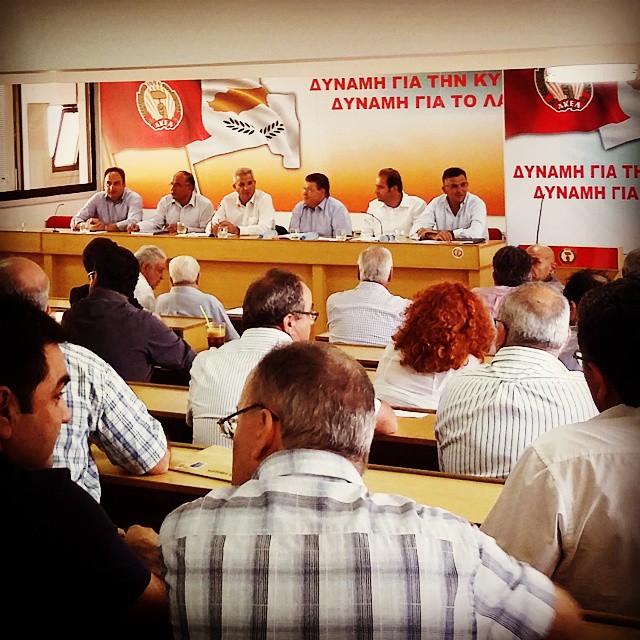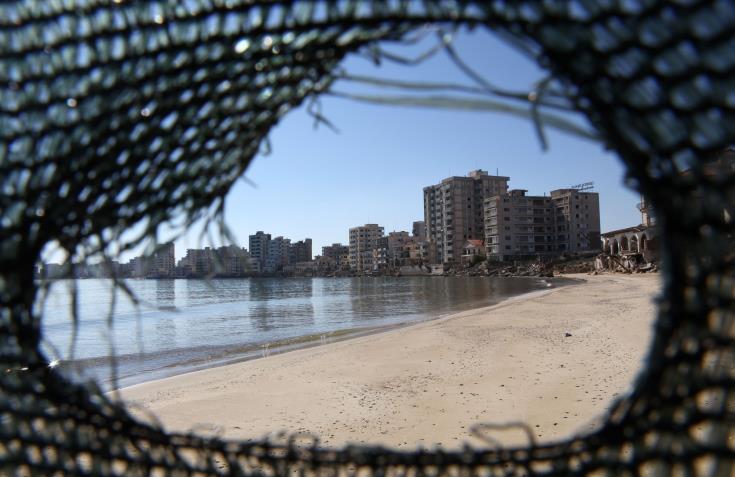
Plenary of AKEL’s Central Committee on developments surrounding the Cyprus problem
AKEL C.C. Press Office, 21st January 2017, Nicosia
 In its session yesterday, the Plenary of the Central Committee of AKEL, having discussed and evaluated the latest developments on the Cyprus problem, concluded the following:
In its session yesterday, the Plenary of the Central Committee of AKEL, having discussed and evaluated the latest developments on the Cyprus problem, concluded the following:
- Assesses the handlings that were made all through this period by the leadership of the Party as correct, which were based on the long-standing positions as these are expressed in its Party Congress decisions.
- Considers the position maintained by the Party with regards the procedure agreed by President Anastasiades and which culminated in the Geneva conference as correct. AKEL believed that the agreement contained potential dangers and that better handlings could have been made. Nevertheless, with the agreement by then given, AKEL chose to act constructively and responsibly, calling on the President of the Republic to utilize the prospects and act preemptively in order to address any potential dangers. In addition, it also called on him promptly to resolve in a precise manner the procedural outstanding issues so that problems will not be caused with substantial implications to the negotiations.
- The results of the Geneva procedure confirm the assessment that we had expressed that as a result of the disagreements that still exist between the two sides, it would be very difficult for this procedure to arrive at an agreement.
- Regardless of the fact that no agreement was achieved, the Geneva procedure yielded results on three points:
i. Maps were submitted on the territorial issue by both sides. It is a fact that the initial proposal tabled by the Turkish Cypriot side is not satisfactory, although it provides for the return of large percentage of territories under Greek Cypriot administration. The submission of the maps creates prospects, through tough negotiation, for an agreement to be reached on the territorial issue, a development that would be helpful towards reaching an agreement on other outstanding issues, such as, for example, on the property issue.
ii. The Geneva conference essentially represented the starting point for the discussion on the issues of Security, which includes the issue of the guarantees and demilitarization. It is very well known that the starting positions of the two sides on this issue are diametrically opposed. The fact that now the issue is under formal discussion with the direct participation of Turkey and with the expressed position of many EU Member States and the Security Council of the United Nations that the current system of guarantees is an anachronism, creates optimism for a positive outcome. This can be achieved through hard work and the utilization of every support that is provided to this end.
iii. Progress was recorded on the chapter of Governance too, even though it concerns secondary issues.
- Regardless of the different readings and assessments political forces are making, the fact is that the negotiations are ongoing. This is precisely where we must focus our attention on. Everything will be judged at the negotiations. The will, positions and proposals of each involved party will be judged in the negotiations. It is at the negotiating table itself where Turkey’s intentions will be judged. Whether we will manage to arrive at an agreed solution will be determined in the negotiations.
- AKEL will not follow the logic of launching accusations and aphorisms which various political forces are continuing to do. Each and everyone’s patriotism, seriousness and responsibility are not judged neither by how loudly and frequently one shouts, nor also by engaging in a bidding game over patriotism.
- Concerns do exist on the Cyprus problem. It is logical that all of us have concerns. However dangers and concerns do not only stem from the possibility of a bad solution, but also from the perpetuation of the partition and the consolidation of Turkey’s presence in Cyprus. We want to rid ourselves of the de facto division and the presence of the Turkish occupation and this can be achieved through the achievement of a just under the circumstances, viable and functional solution; a solution that can only be achieved through negotiations. The negotiation demands assertiveness, consistency to positions of principle, but it also demands pragmatism.
- AKEL has its positions and assesses developments on the basis of these positions. And because AKEL is genuinely seeking to achieve a solution within the framework of the agreed basis, it will continue to act constructively and creatively, even when it has different views, submitting concrete proposals. No problem whatsoever cannot and has not been solved through nullification, rejection and by the constant invoking of dangers.
- AKEL will continue to work with seriousness, responsibility and patriotism to achieve an agreed solution of the Cyprus problem; a solution that will liberate and reunite the country and the people within the framework of a bizonal, bicommunal federation.
- AKEL welcomes the events and meetings of Greek Cypriots and Turkish Cypriots in favour of the negotiations and the efforts to reach a solution. The common struggle of Greek Cypriots and Turkish Cypriots enhances the perspective of a solution and sends out a powerful message of the peaceful coexistence of our people in a united, free and peaceful common homeland.




